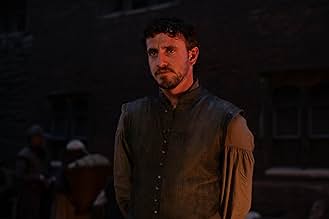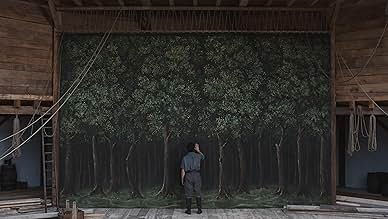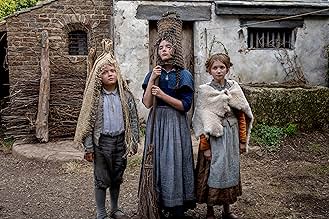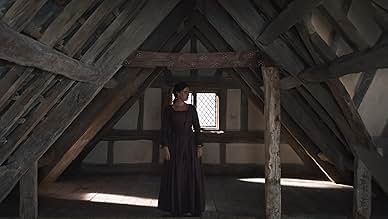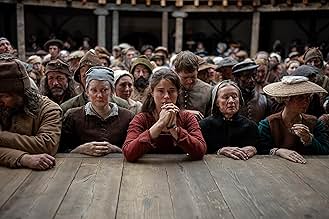A powerful story of love and loss that inspired the creation of Shakespeare's timeless masterpiece, Hamlet.A powerful story of love and loss that inspired the creation of Shakespeare's timeless masterpiece, Hamlet.A powerful story of love and loss that inspired the creation of Shakespeare's timeless masterpiece, Hamlet.
Coming soon
Releases December 12, 2025
- Awards
- 7 wins & 3 nominations total
- Director
- Writers
- All cast & crew
- Production, box office & more at IMDbPro
8.2802
1
2
3
4
5
6
7
8
9
10
Featured reviews
Almost As Powerful As Ojello and Macseth
I enjoy these prequels where the novelists pretend they get into mindset of long dead authors and playwrights to figure out what inspired their masterworks. It looks suitably heartbreaking, and very realistic hygiene-wise; I like when you feel like you can smell the stank crevices of characters in pre-industrial dramas, unlike say the upcoming "Wuthering Heights" which looks cut together from leftover close-ups of Margot Robbie from her 2014 Tarzan and various Gucci commercials. Hopefully King Beer clarifies Will's greatest masterpiece. Brought to you by Irish Spring!
Will on a Farm
There's this 16th century guy named Will. He lives on a farm in England. Will meets a girl, knocks her up, they marry, and build a happy family. Will travels for work. Then the unthinkable happens.
The first half plays like Malick with steadier pacing, light and texture, before shifting into something heavier. That's when Will becomes Shakespeare.
Artists across eras reflect the best and worst of humanity. The rest of us may lack their tools of expression, but we're all shaped by tragedy.
You don't need to love Shakespeare or theatre to feel the power of art, how it helps creators wrestle with pain and how it helps audiences recognize one another.
It's that connection that makes us human.
The first half plays like Malick with steadier pacing, light and texture, before shifting into something heavier. That's when Will becomes Shakespeare.
Artists across eras reflect the best and worst of humanity. The rest of us may lack their tools of expression, but we're all shaped by tragedy.
You don't need to love Shakespeare or theatre to feel the power of art, how it helps creators wrestle with pain and how it helps audiences recognize one another.
It's that connection that makes us human.
Deconstructing grief
Hamnet is an exceptional movie - its only weakness being that it tries unnecessarily too hard to extract a tear at every turn, drawing on the full armamentarium of tools available to a crafty storyteller like Chloe Zhao. Ultimately, the movie takes you on a journey through life of a typically family. William meets Agnes, Agnes gets pregnant, they get married, they face difficulties in their lives and work, they have twins, they are protective of their children and premonitory about losing a child too. William has to spend significant time in London for work. They lose a child to pestilence. They process grief in their own way.
This movie has all the necessary ingredients to cater to a wide range of audiences and their respective beliefs about reconciling that kind of grief: ghosts, afterlife, mystical forest, abyss, dark holes, underworld (yes, Orpheus' story is woven into the story too), sky burial, perhaps a dream, too. Stillbirth that was not, connection between twins, mysterious connection with nature - a buffet of transcendent beliefs. There are twists too, not unlike those in The Six Sense or The Others. All leading to a catharsis that may have been more profound, if one were not already in tears throughout the whole movie. But, it was therapeutic and liberating, nevertheless. Jessie Buckley, Paul Mescal and Jacobi Jupe contribute masterfully to every single emotional exploitation in this well-crafted deconstruction of grief and Hamlet.
My wife and I watched the premiere at TIFF, with the Roy Thomson Hall always being an unmatchable, immersive venue to watch a movie, particularly one with a score like Hamnet's, supporting and amplifying the tension-building moments with Max Richter's intense music. As I have already pointed to Chloe Zhao not missing a single opportunity to draw on whatever values the audience may already have, here is the use of "On the Nature of Daylight" track (amplifying so intensely the preordained loss of a child to rare disease in Arrival). On the one hand, it was incredible to watch Chloe Zhao and Emily Watson's reactions to the movie, as it unfolded, just across the aisle from us. On the other hand, it was impossible to contain the emotional rollercoaster this movie has trapped us in - less than a year ago (on a trip through Denmark, of all places, where Hamlet is set), our three year old son caught severe pneumonia, deteriorated in the middle of the night from what appeared like a bad cold into a near comatose condition. Despite getting him to one of the best pediatric hospitals in the world, over the next week, the infection got worse and we endured for days holding and watching his near-lifeless septicemic body, not knowing whether he will wake up the same and whether he will wake up at all. This was a traumatic experience in a foreign country that left its scars. Watching Hamnet made us relive all of this in a span of two hours - that immeasurable, unimaginable, irreversible loss of a child full of unadulterated joy, dreams, aspirations, potential. I last felt this way when I watched Manchster by the Sea, but that was before I would come to experience my own child. Hamnet is portrayed in the movie to die from what appears as pneumonic plague - rare, but most rapidly progressing - in agony - it is devastating. Yet, we had a happy ending of sorts - our child survived. But it was crashing to watch the family on screen process this grief in their own way. It was beautiful to see them endure. We are drawn to tragedy in a paradoxical manner. Chloe Zhao knows and fully embraces that throughout her work, but also by preparing the audience for the experience (yes - there was a brief breathing exercise and meditation) and providing some closure in her commentary after - we live, we experience loss and grief, most of us find what to continue living for (to be or not to be), and we die, inevitably. I can only speculate, but she appears to have gone for absolute certainty to reach into the very soul of every person in the audience and touch them and unite them with strangers around the room with her masterful storytelling. There is much, much more to be said about this movie than I have. It is a must see and will surely collect many awards for its creators, but, most importantly, will solidify its place in art and history as a masterpiece.
This movie has all the necessary ingredients to cater to a wide range of audiences and their respective beliefs about reconciling that kind of grief: ghosts, afterlife, mystical forest, abyss, dark holes, underworld (yes, Orpheus' story is woven into the story too), sky burial, perhaps a dream, too. Stillbirth that was not, connection between twins, mysterious connection with nature - a buffet of transcendent beliefs. There are twists too, not unlike those in The Six Sense or The Others. All leading to a catharsis that may have been more profound, if one were not already in tears throughout the whole movie. But, it was therapeutic and liberating, nevertheless. Jessie Buckley, Paul Mescal and Jacobi Jupe contribute masterfully to every single emotional exploitation in this well-crafted deconstruction of grief and Hamlet.
My wife and I watched the premiere at TIFF, with the Roy Thomson Hall always being an unmatchable, immersive venue to watch a movie, particularly one with a score like Hamnet's, supporting and amplifying the tension-building moments with Max Richter's intense music. As I have already pointed to Chloe Zhao not missing a single opportunity to draw on whatever values the audience may already have, here is the use of "On the Nature of Daylight" track (amplifying so intensely the preordained loss of a child to rare disease in Arrival). On the one hand, it was incredible to watch Chloe Zhao and Emily Watson's reactions to the movie, as it unfolded, just across the aisle from us. On the other hand, it was impossible to contain the emotional rollercoaster this movie has trapped us in - less than a year ago (on a trip through Denmark, of all places, where Hamlet is set), our three year old son caught severe pneumonia, deteriorated in the middle of the night from what appeared like a bad cold into a near comatose condition. Despite getting him to one of the best pediatric hospitals in the world, over the next week, the infection got worse and we endured for days holding and watching his near-lifeless septicemic body, not knowing whether he will wake up the same and whether he will wake up at all. This was a traumatic experience in a foreign country that left its scars. Watching Hamnet made us relive all of this in a span of two hours - that immeasurable, unimaginable, irreversible loss of a child full of unadulterated joy, dreams, aspirations, potential. I last felt this way when I watched Manchster by the Sea, but that was before I would come to experience my own child. Hamnet is portrayed in the movie to die from what appears as pneumonic plague - rare, but most rapidly progressing - in agony - it is devastating. Yet, we had a happy ending of sorts - our child survived. But it was crashing to watch the family on screen process this grief in their own way. It was beautiful to see them endure. We are drawn to tragedy in a paradoxical manner. Chloe Zhao knows and fully embraces that throughout her work, but also by preparing the audience for the experience (yes - there was a brief breathing exercise and meditation) and providing some closure in her commentary after - we live, we experience loss and grief, most of us find what to continue living for (to be or not to be), and we die, inevitably. I can only speculate, but she appears to have gone for absolute certainty to reach into the very soul of every person in the audience and touch them and unite them with strangers around the room with her masterful storytelling. There is much, much more to be said about this movie than I have. It is a must see and will surely collect many awards for its creators, but, most importantly, will solidify its place in art and history as a masterpiece.
Good Movie
Rating - 8.0:
Overall, a profound movie on loss and grief, Jessie Buckley and Paul Mescal deliver powerful performances to show how a personal tragedy led to Shakespeare writing one of his most memorable works, culminating in a phenomenal and gut-wrenching climax; I wanted to love this movie more, but unfortunately, this movie is held back from being great by its poor plot structure and incredibly dry moments at times, as it genuinely feels like an entire 30-minute third act was cut from this movie.
Direction - Good: The direction on a macroscale is a little too artsy and dry, while they do a very good job showing how beautiful this Shakespearean world is, the cinematography and editing were a little too dry for me; The direction on a microscale is great, as you really can see the relationships between the characters, helping emphasize the grief and trauma they feel when the conflict arises; There are many moments in this direction that are truly beautiful and powerful to watch, like some of the monologues in the later half of the movie and the entire ending, but these moments feel washed out from the dry and boring moments that feel dragged on; Storytelling is a huge issue for this movie because it cannot tell the story properly because the plot structure is imbalanced; They build tension incredibly well in the second half because of how emotionally invested you are in this conflict and how these characters are dealing with it
Story - Pretty Bad: Even though the concept is a really interesting idea, that Shakespeare's son Hamnet's death inspired him to write Hamlet, this concept is poorly told because of its bad plot structure; The plot structure is the biggest issue for this movie because the first half of the movie is entirely exposition, and the conflict is introduced past the halfway point, leaving less than an hour to actually address the conflict of the story; It almost feels like an entire act has been cut from this movie, as there are maybe one or two scenes between the conflict introduction and the climax, leaving no room for the actual concept for this movie; The character writing is great, as they really explore the grief and trauma these characters experience with the loss of a loved one, and how they influence their lives moving forward
Screenplay - Very Good: The dialogue is very Shakespearean and incredibly profound; the symbolism is rich as it deals with the trauma and grief of losing a child, with the performances feeling heavy and incredibly authentic as you empathize with what they are going through; the foreshadowing is strong as the loss in the movie helps inspire an architect, Hamlet, though you kind of already know what this movie is about if you read the given synopsis
Acting - Very Good: Jessie Buckley - Great (A truly magnetic performance that captures both the strength and vulnerability of Agnes; She shows the complexity of a mother grieving the loss of her child while also trying to navigate her own identity, with her husband not being there for her time in need; has great chemistry with Paul Mescal), Paul Mescal - Great (A truly powerful performance that feels very authentic to Shakespeare as he shows how the grief of his son Hamnet leads him to create his most iconic work, Hamlet; has great chemistry with Jessie Buckley), Rest of the cast - Good (The supporting cast is strong, with each actor bringing depth to their roles and enhancing the overall emotional impact of the story, especially the children in the film who have to navigate this tragedy; everyone in this movie feels authentic to the Shakespearean time period)
Score - Very Good: The score is very beautiful and helps set the tone of the movie; the problem is it is used sparingly because Zhao uses a lot of silence throughout the movie to let the dialogue and performances set the tone itself; even though it does make the movie feel dry at times
Soundtrack - Very Good: Even though "On the Nature of Daylight" is used perfectly in this movie, Max Richter needs to let this song go
Cinematography - Decent: A real spectrum of shots exists, as there are many shots and sequences in this movie that are truly beautiful to watch, yet there are many shots that just feel unnecessarily artsy and dry
Editing - Pretty Bad: The biggest issue for this movie is because many of the stitches and transitions just feel too basic and dry
Sound - Pretty Good: Helps show the beauty in the scenes; The lack of sound in some scenes does help emphasize the emotions of the characters, but also makes the movie feel dry at times
Production Design - Great: Truly emulates this Shakespearean time period with its authentic sets and locations
Costumes - Great: Truly emulates this Shakespearean time period with its authentic wardrobes
Pacing - Pacing is a complete mess as the first half of this movie is incredibly slow because it feels like exposition, and the entire second half feels incredibly rushed because they basically have to tell the story in under an hour; This movie feels like a whole thirty-minute third act was cut as there is barely any rising action; If they wanted to keep this runtime, which they should not, they should have cut the exposition in half and transferred it to scenes after the conflict introduction to help balance the movie, but they should have honestly just increased the runtime because this movie just feels too short
Climax - Climax is phenomenal and gut-wrenching as it is executed perfectly as you empathize with Agnes and Will as they bring to life Hamnet through Hamlet, with the final sequence being incredibly emotional
Tone - Tone is very much a Shakespearean tragedy
Final Notes - Saw premiere at Austin Film Festival; It is genuinely crazy when this movie decides when it wants to be fantastic and why it wants to be dry and boring.
Direction - Good: The direction on a macroscale is a little too artsy and dry, while they do a very good job showing how beautiful this Shakespearean world is, the cinematography and editing were a little too dry for me; The direction on a microscale is great, as you really can see the relationships between the characters, helping emphasize the grief and trauma they feel when the conflict arises; There are many moments in this direction that are truly beautiful and powerful to watch, like some of the monologues in the later half of the movie and the entire ending, but these moments feel washed out from the dry and boring moments that feel dragged on; Storytelling is a huge issue for this movie because it cannot tell the story properly because the plot structure is imbalanced; They build tension incredibly well in the second half because of how emotionally invested you are in this conflict and how these characters are dealing with it
Story - Pretty Bad: Even though the concept is a really interesting idea, that Shakespeare's son Hamnet's death inspired him to write Hamlet, this concept is poorly told because of its bad plot structure; The plot structure is the biggest issue for this movie because the first half of the movie is entirely exposition, and the conflict is introduced past the halfway point, leaving less than an hour to actually address the conflict of the story; It almost feels like an entire act has been cut from this movie, as there are maybe one or two scenes between the conflict introduction and the climax, leaving no room for the actual concept for this movie; The character writing is great, as they really explore the grief and trauma these characters experience with the loss of a loved one, and how they influence their lives moving forward
Screenplay - Very Good: The dialogue is very Shakespearean and incredibly profound; the symbolism is rich as it deals with the trauma and grief of losing a child, with the performances feeling heavy and incredibly authentic as you empathize with what they are going through; the foreshadowing is strong as the loss in the movie helps inspire an architect, Hamlet, though you kind of already know what this movie is about if you read the given synopsis
Acting - Very Good: Jessie Buckley - Great (A truly magnetic performance that captures both the strength and vulnerability of Agnes; She shows the complexity of a mother grieving the loss of her child while also trying to navigate her own identity, with her husband not being there for her time in need; has great chemistry with Paul Mescal), Paul Mescal - Great (A truly powerful performance that feels very authentic to Shakespeare as he shows how the grief of his son Hamnet leads him to create his most iconic work, Hamlet; has great chemistry with Jessie Buckley), Rest of the cast - Good (The supporting cast is strong, with each actor bringing depth to their roles and enhancing the overall emotional impact of the story, especially the children in the film who have to navigate this tragedy; everyone in this movie feels authentic to the Shakespearean time period)
Score - Very Good: The score is very beautiful and helps set the tone of the movie; the problem is it is used sparingly because Zhao uses a lot of silence throughout the movie to let the dialogue and performances set the tone itself; even though it does make the movie feel dry at times
Soundtrack - Very Good: Even though "On the Nature of Daylight" is used perfectly in this movie, Max Richter needs to let this song go
Cinematography - Decent: A real spectrum of shots exists, as there are many shots and sequences in this movie that are truly beautiful to watch, yet there are many shots that just feel unnecessarily artsy and dry
Editing - Pretty Bad: The biggest issue for this movie is because many of the stitches and transitions just feel too basic and dry
Sound - Pretty Good: Helps show the beauty in the scenes; The lack of sound in some scenes does help emphasize the emotions of the characters, but also makes the movie feel dry at times
Production Design - Great: Truly emulates this Shakespearean time period with its authentic sets and locations
Costumes - Great: Truly emulates this Shakespearean time period with its authentic wardrobes
Pacing - Pacing is a complete mess as the first half of this movie is incredibly slow because it feels like exposition, and the entire second half feels incredibly rushed because they basically have to tell the story in under an hour; This movie feels like a whole thirty-minute third act was cut as there is barely any rising action; If they wanted to keep this runtime, which they should not, they should have cut the exposition in half and transferred it to scenes after the conflict introduction to help balance the movie, but they should have honestly just increased the runtime because this movie just feels too short
Climax - Climax is phenomenal and gut-wrenching as it is executed perfectly as you empathize with Agnes and Will as they bring to life Hamnet through Hamlet, with the final sequence being incredibly emotional
Tone - Tone is very much a Shakespearean tragedy
Final Notes - Saw premiere at Austin Film Festival; It is genuinely crazy when this movie decides when it wants to be fantastic and why it wants to be dry and boring.
I had the highest highest hopes....
I love nothing more than a good movie cry. I was excited all day to go see this movie and have a good movie cry. Alas my eyes have never been dryer. Overwrought and self important to the point of self-parody. At some hyper-dramatic moments I did hear some laughter in the theater, so I wasn't alone, but my wife sobbed her eyes out pretty much beginning to end, so maybe I went in with too much expectation. Also I am a rabid fan of Chloe Zhao and could feel little of her extraordinarily unique voice in this movie - she seems to have been subsumed into the Spielberg/Mendes brainwave. Kudos all around to the craft -- design, music, wardrobe, lighting.
The Big List of Fall Movies 2025
The Big List of Fall Movies 2025
See a full list of all the movies coming to theaters this fall.
Did you know
- TriviaWhile the name of Shakespeare's wife is usually spelled Anne Hathaway, in legal documents her father spelled her name Agnes. In the early modern period it was common for names to have alternate spellings. Maggie O'Farrell chose to use the name Agnes for her protagonist.
- ConnectionsReferenced in Radio Dolin: The 16 Most Anticipated Films of the 2025 (2025)
- SoundtracksMy Robin To The Greenwood Gone
written by Traditional
2025 TIFF Festival Guide
2025 TIFF Festival Guide
See the current lineup for the 50th Toronto International Film Festival this September.
- How long will Hamnet be?Powered by Alexa
Details
- Runtime
- 2h 5m(125 min)
- Color
Contribute to this page
Suggest an edit or add missing content





